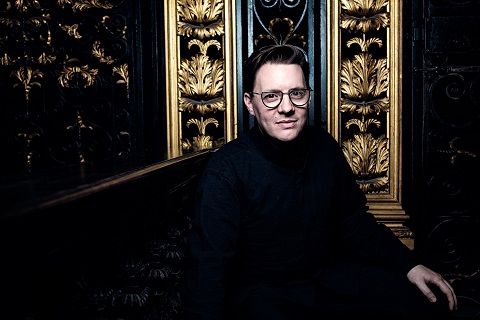But, while my attention was drawn to freshening rhythmic gestures in the
bass line or inner instrumental voices, and captivated by the enrichment
provided by the varying continuo ensemble of theorbo (Alex McCartney
(occasionally switching to baroque guitar) and Lynda Sayce) and harp
(Siobhan Armstrong), I missed the essential simplicity and sincerity of the
work in this lunchtime performance at the Wigmore Hall, where Dido
was presented as part of the 2018 London Handel Festival.
I wondered how much time the talented young soloists and chorus members had
had to consider and rehearse the practical matters of stage business.
Although La Nuova Musica essentially played one-to-a-part and the
chorus was formed largely from those taking small solo roles, the Wigmore
Hall stage looked uncomfortably crowded. Principal soloists sat
stage-right, moving centre for their arias; minor soloists, for the most
part, moved to the front, negotiating the instrumentalists - and sometimes
other singers - as they made their way to the fore-stage. Though Bates
swept fluently from recitative to aria to chorus in a seamless musical
continuum, it looked - and thus felt - a little clunky at times.
Singers dealt differently with the circumstances. While tenor Nick
Pritchard fairly bounded forward to deliver the Sailor’s light-voiced,
vigorous plea to his fellow tars to ‘Come Away’ from the shore-bound
nymphs’ allurements and set forth with the impatient tide, bass Richard
Bannon took two steps forward, through the viola da gambas, and
forthrightly issued the Spirit’s decree that Aeneas must ‘forsake this
land’ with statuesque and dark-hued weight.
After Anna Dennis had delivered Belinda’s slightly too frank and forte appeal to Rachel Kelly’s Dido to ‘Shake the cloud from your
brow’ - for goodness sake stop wallowing in self-pity, for your solipsistic
sorrow is making us all miserable, she seemed to infer - Kelly found
herself directing her response, ‘Ah Belinda, I am press’d with torment’, to
her conductor, as her companion-servant Belinda had retreated to her seat
at the side. Subsequently, Kelly found herself ‘stranded’ onstage during
‘Fear no danger to ensue’ (Belinda, Second Woman and Chorus), and struggled
to stay ‘in role’ (i.e. Dido has just sung of her fear that her pity for
the distress of others will be her undoing) when tempted to smile at the
beguiling quality of the choric assurance that Cupid has strewn Dido’s path
with flowers.
But, these are, for the most part, tangential matters. The singing was
characterful, and none more so than in the choruses which were
invigorating, dramatic and lithe, always propelling the action forward -
though the witches’ ‘Ho, ho, ho!’s were rather demure!
Dennis, after a somewhat resounding start - one might expect a slightly
lighter voice embodying this impulsive stirrer - found the measure of the
Hall, and her mezzo settled beautifully though she remained, to good
effect, unafraid to lean on expressive textual details or emotive
appoggiaturas. ‘Thanks to these lonesome vales’, sung within the tranquil
grove, was bright, full and satisfying, the viola da gamba offering further
comforting support. Emilie Renard was a Sorceress of supercilious eye-brow
raising, sly smiles and sultry vocal tone, and Louise Kemény impressed as
the Second Woman: her Act 2 number, ‘Off she visits this lone mountain’,
was richly enhanced by the theorbos’ gentle charm and the contrasting
animation of the viola da gamba.
I admired George Humphreys’ two embodiments of Cavalli’s Giove in 2016 (for
English Touring Opera
and for La Nuova Musica at Wigmore Hall (where I found his
powerful baritone, ‘haughtily contemptuous as he surveyed the destruction
wreaked on the mortals’ and that ‘his appealing tone captured Giove’s
presumptuousness’), as well as the inspiring power and brightness that the
baritone put to good use as Lieutenant Jenkins in WNO’s
In Parenthesis
that year. Humphreys has now joined the ensemble of Salzburg State Theatre
and is no doubt destined for satisfying success. But the physical stature
and vocal sonority which made his Demetrius so compelling at
Snape Maltings
in June 2017 made this Aeneas seem rather too big for his boots. One could
not fault either technique or attention to textual detail, though; Act 3’s
encounter with the Spirit was dramatically intense and engaging, the
emotional twists and turns of ‘But ah! what language can I try/ My injur’d
Queen to pacify’ being matched by diversity of tone, colour, dynamics,
weight and pace.
My one disappointment was Rachel Kelly’s Dido, all the more so for the
pleasure that her singing has brought on many other occasions. While the
melismas bristled and shone, and she keenly communicated the moments of
heightened emotional piquancy and distress, Kelly did not look entirely
comfortable in the role of the deserted Queen. I missed a sure, smoothness
of line; and the text was not always clearly enunciated, even when set with
Purcellian naturalness. ‘Remember me’ is the appeal of the dying Queen …
but, I’m not sure one would. I think it boiled down to ‘trying too hard’:
vocal sophistication is not what is needed here, as I suggested at the
start, it is simplicity and sincerity which make Purcell’s greatness,
genius and musical generosity felt.
Claire Seymour
Purcell:
Dido and Aeneas
London Handel Festival
Dido - Rachel Kelly, George Humphreys - Aeneas, Belinda - Anna Dennis,
Sorceress - Emilie Renard, First Witch - Helen Charlston, Second Witch -
Martha McLorinan, Second Woman - Louise Kemény, Sailor - Nick Pritchard,
Spirit - Richard Bannan; La Nuova Musica - David Bates
(harpsichord, organ, director), Anaïs Chen and James Toll (violins), Jane
Rogers (viola), Jonathan Rees and Ibraham Aziz (viola da gamba), Alex
McCartney and Lynda Sayce (theorbo), Siobhan Armstrong (harp).
Wigmore Hall, London; Saturday 7th April 2018.
